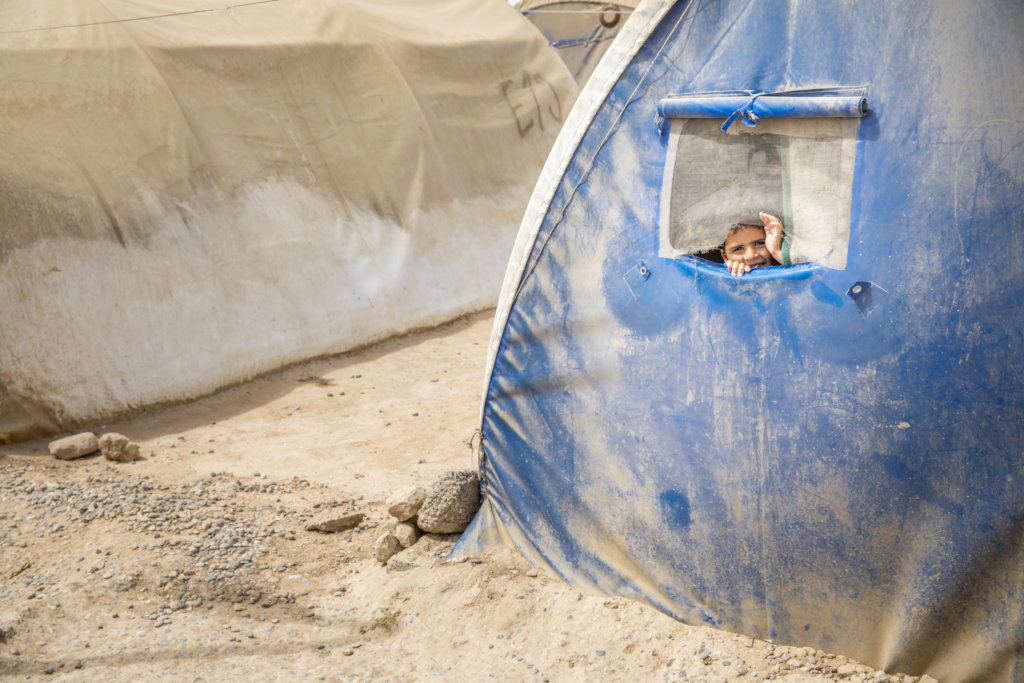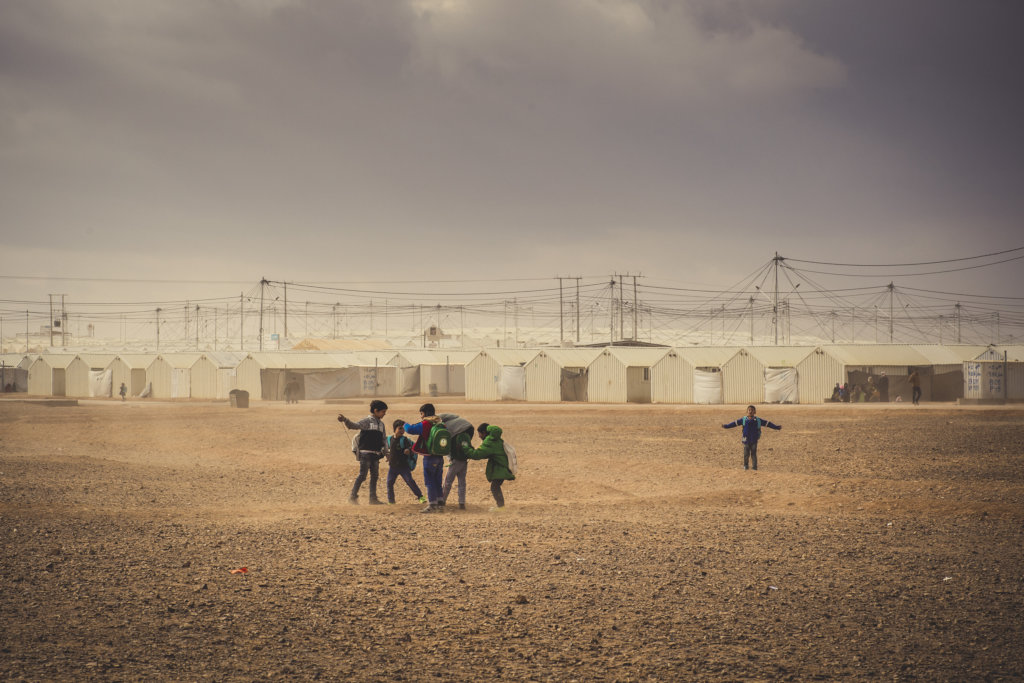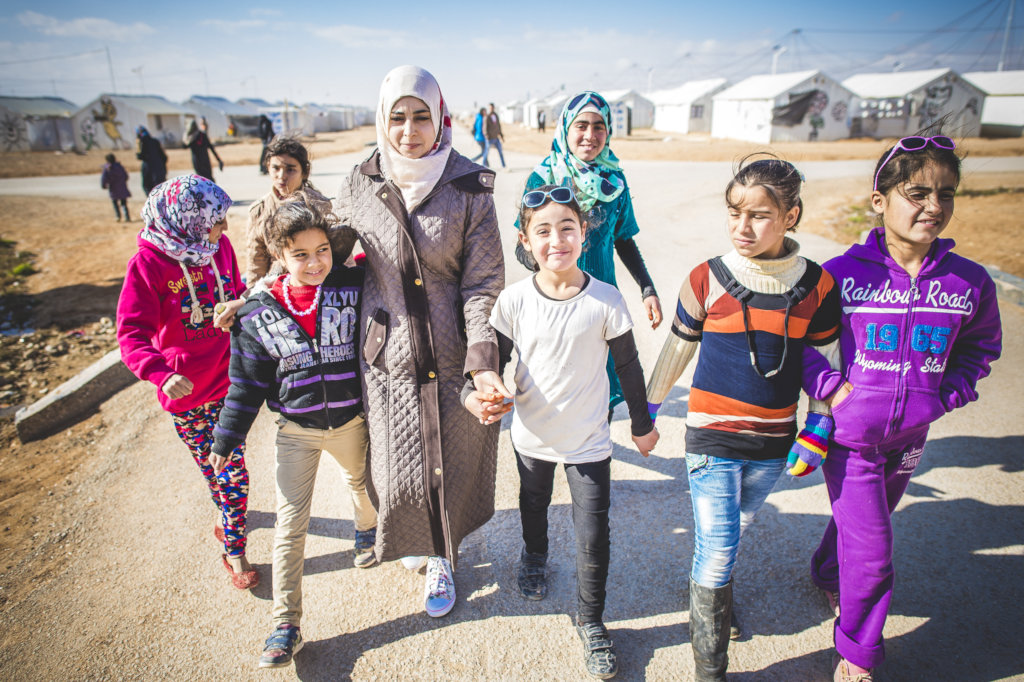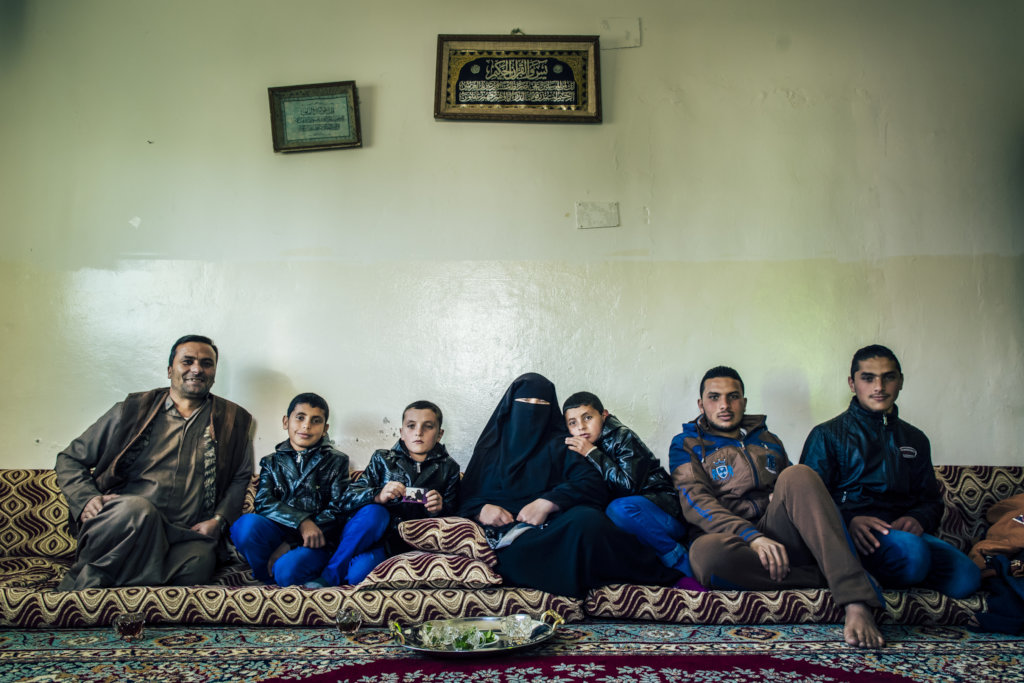By Scott Latta | Staff writer
Seven years after the Syrian war unleashed one of history’s worst humanitarian crises, about 5 million refugees are still sheltering in neighboring countries. Jordan hosts 700,000 Syrians, while Lebanon provides refuge to nearly 1 million—enough to total one-quarter of its population. The conflict has transformed these two countries, creating new political, demographic and economic challenges. Photo above: Ezra Millstein/Mercy Corps. All other photo: Sean Sheridan for Mercy Corps.
Below, Mercy Corps’ country directors in Lebanon and Jordan, George Antoun and Hunter Keith, explain how this crisis is reshaping the region, the difficulty of anticipating what may happen next, and how Mercy Corps is working to reach Syrian, Jordanian and Lebanese families in a crisis that has grinded on far longer than most imagined.
In Jordan and Lebanon, Mercy Corps provides emergency assistance, helps strengthen the fabric of Syrian and host communities, and provides tools to boost livelihoods and help develop local economies. Read on to learn more.
Would you both describe some of the ways your programs help people?
GEORGE ANTOUN: Our work empowering communities in Lebanon includes a focus on women and girls, which leads to better governance and community participation. We also have projects to end gender-based violence that help women, children and men. We provide skills training and social support for kids and youth who are troubled, whether they are out of school or have problems in their families.
We also do vocational training to boost people’s skills to improve their chances in the job market, as well as support small and medium-sized enterprises by providing software, equipment or consultants to work with them on strategy. Among the urgent needs that we address are providing water, building latrines and working with communities on larger projects, such as fixing the water network.
HUNTER KEITH: In Jordan, we have projects devoted to child welfare in the Azraq and Zaatari refugee camps to provide spaces where children can play and learn. We also work with people with disabilities to integrate them into formal education, both in schools in the camps and host communities. Most of those beneficiaries are Syrian, but there are Jordanians as well.
We also help Syrian beneficiaries in host communities with cash assistance for things like winterization or civil documentation. There is a huge number of Syrians who never went through an official registration process with either the UN or another agency or who left camps without formal permission. Others need help providing educational documents or proof of marriage to gain work permits. Documentation is really important for folks who never quite got their papers in order when they fled their homes in a war zone.
How has the response from host communities evolved over seven years?
GEORGE ANTOUN: When Syrian refugees started pouring in to Lebanon, the political situation in the country was so complex that none of the political parties wanted to touch it, which is why we have informal settlements. It was really chaotic at the beginning, but with time, and with the help of the United Nations and nonprofits like Mercy Corps, it improved. Nonprofits created a forum about four years ago that now includes 42 international humanitarian agencies coordinating with each other.
Now we see the government trying to apply more centralization than before. The government is engaged. Last year, the government waived the annual fee of $200 for residence permits that many Syrians had struggled to pay. This includes all Syrians aged 15 and above, however, refugees tell us the fee waiver is not implemented coherently and refugee men of working age are sometimes excluded from obtaining legal stay. This is pushing them to find a Lebanese sponsor, a process that may cost as much as $1,000, expose them to exploitation, and affect their refugee status as they are often labeled migrant workers.
How does integrating Syrians in their host communities impact community relations? Are they being accepted, or not?
HUNTER KEITH: Once you resolve the humanitarian needs, then you can start working at the community level to integrate people, and then you have some opportunities to help make communities more prosperous.
Our programs drive real collaboration between Syrians and Jordanians in areas that have taken in large numbers of refugees. We reach out to both groups and say, "Look, we have some resources that we can use to improve infrastructure and services. We need your cooperation as a group to help us understand what your priorities are." This gets the two groups talking with one another, and they usually come out with a much better understanding of each other’s issues and how they can solve them jointly.
Once you resolve the humanitarian needs, then you can start working at the community level to integrate people, and then you have some opportunities to help make communities more prosperous.
There’s a lot of economic pain in Jordan, even if you were to take away the refugee issue. The loss of trade with Iraq and Syria over the last two decades has made this a place of desperate challenges. Jordan has been very generous with refugees, but there is some fatigue and very real pressures on people and the economy.
GEORGE ANTOUN: In Lebanon, all but two of our programs are a mixture of Lebanese, Syrians and sometimes Palestinian refugees. Before the war, Lebanon was used to hosting 300,000 or more Syrians who worked in agriculture and construction because you couldn’t find Lebanese to do these jobs. The difference now is that instead of having unskilled laborers, you have plumbers, electricians and doctors, and this has increased tension and competition between local communities and Syrian refugees.
Employment always comes out as the number one driver for tension, including some demonstrations over Syrians taking jobs. Fortunately, it never became a bigger conflict and remains at a local level.
Can you give an example of how Syrians and host communities are working together to benefit both communities?
GEORGE ANTOUN: Research shows if you simply improve infrastructure or services without interaction, tensions remain high. Some of our programs help people create committees of Syrians and Lebanese to promote more interaction. We engage Syrian and Lebanese workers together to complete a public project that benefits the whole community, and this diffuses the tension.
HUNTER KEITH: We have a huge staff of Syrians, and every one of them has a really interesting story. One is Sami, who worked with kids in the gym at Zaatari. When his family left the camp to resettle in Algeria, he chose to stay because he loved working with young people. The camps are interesting places because whole communities of people wind up together who would otherwise have segregated themselves, the elites from the non-elites, people from different professions, even men and women.
About one-third of the Syrians in Jordan are under the age of 25. What role will they play in the future peace of the region? Could you describe Mercy Corps’ research on how to end the cycle of violence?
HUNTER KEITH: Development and relief programs often focus on things like essential services and employment, but violent groups recruit by offering vulnerable people something much different.
If you survey people about what they expect from the government, you will get a laundry list of material desires, such as goods and services, without any real critical thought about what government actually is. But if you instead ask them what they expect from the people around them—their neighbors, their family, their friends—you force them to think much more critically about what it takes, for example, to build a road. Do I expect my neighbor to contribute to a community path that is then going to deliver a service to me?
What are some of the responses you have heard from people?
HUNTER KEITH: People take a step back and say, “I expect my neighbors to be nice to me, I expect them to be fair, I expect that when I have a problem, they may help me solve it.” That’s what extremist groups offered to these people. It has to do with much more than material desires; it has to do with how people relate to one another.
If we want to be smart about how we work against that, we need to understand it better. Then we need to work through the structures of government. That’s what an organization like Mercy Corps can do—provide small examples of those alternatives in communities at the grassroots level.
As they mark the grim anniversary of another year of war, what do Syrians expect from the next 12 months?
GEORGE ANTOUN: Honestly, no one is sure. If you look at the landscape in Syria, a lot has changed in the past year. You see the government taking territory and consolidating power. If this continues, we are moving to a new situation where there could be large areas in Syria where there is no fighting. However, if there is no peace settlement and peace treaty in Syria, it is still unsafe for refugees to start returning.
But you cannot stop them. If you have wide areas in Syria that are relatively safe, where there is no more fighting, that are under the control of one party, then people may start thinking of going back, especially if humanitarian assistance in Lebanon or Jordan keeps decreasing.
Most of the Syrians you speak with say they would definitely go back. But their towns are destroyed, there is nothing for them to go back to right now.
HUNTER KEITH: Our concern, as Mercy Corps, is for the protection of people who might be forced to go back to Syria. If there were a clear future with a clear outcome, that would be one thing. You would have people here carefully considering their options. But, seven years on, I don’t know that people have the information they need to start piecing through that for themselves. The saddest aspect is it won’t be resolved for many years.
I suspect that the image of Syria in the minds of most Syrians is just horribly complicated. People still think of Syria as home, but that is very different from practical expectations of return. So a lot of people assume they will be here a very long time, if not forever.
How you can help
Links:
By Scott Latta | Staff writer
By Kelly Montgomery | Fundraising copywriter
Project reports on GlobalGiving are posted directly to globalgiving.org by Project Leaders as they are completed, generally every 3-4 months. To protect the integrity of these documents, GlobalGiving does not alter them; therefore you may find some language or formatting issues.
If you donate to this project or have donated to this project, you can receive an email when this project posts a report. You can also subscribe for reports without donating.
Support this important cause by creating a personalized fundraising page.
Start a Fundraiser


